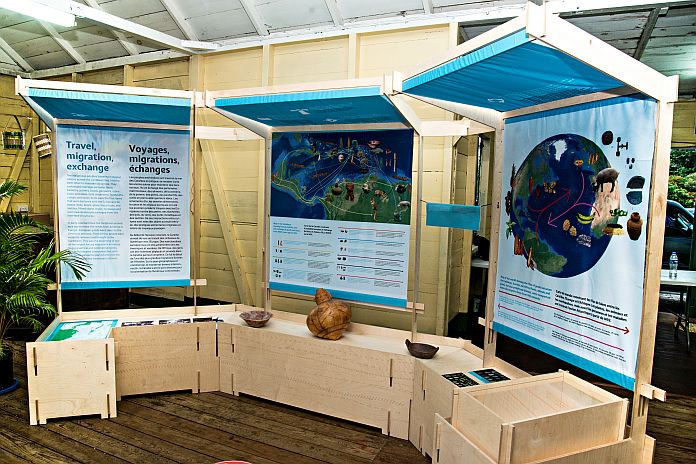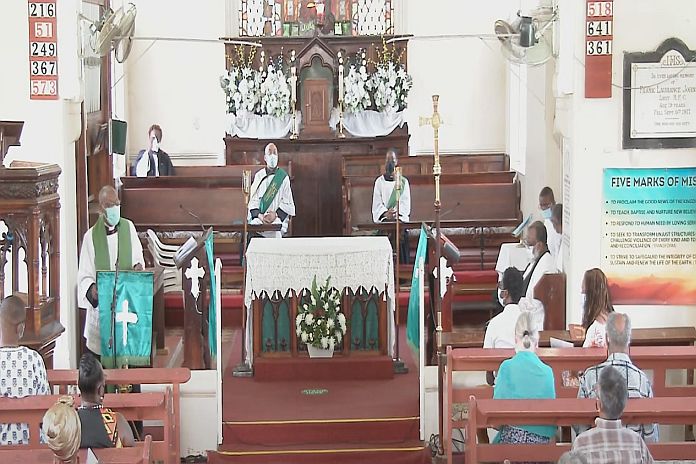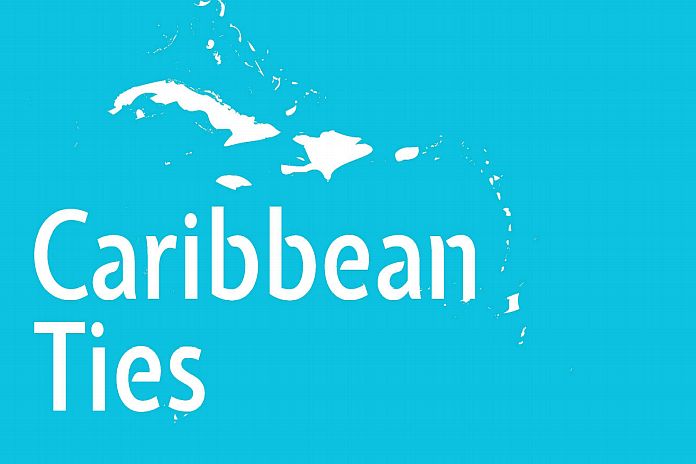By Caribbean News Global contributor
CASTRIES, St Lucia – The much anticipated Caribbean Ties Exhibition August 1-31, 2021 was officially opened with an inspirational ceremony at the Holy Trinity Anglican Church, on Sunday, with the twin observances of Emancipation Day, filled with scripture from Exodus 6:2-13 and Luke 4: 16-19 followed with a sermon most bequeath of the times, by Monsignor Patrick Anthony, titled – The Lion writes.
Monsignor Anthony celebrated Caribbean people, the power of a once enslaved people, power of once dominated people, the power of a people who discover their potentiality, and who can ride to the summit of the potentiality, that’s the power of Caribbean people.
“And I’m really delighted Archdeacon, by the Anglican community, to have this Caribbean connection on this Emancipation Day,” said Monsignor Anthony.
“Could you imagine that this is the most significant event happening for emancipation day in Saint Lucia?” he questioned. “If you didn’t do that, we had nothing,” said Monsignor Anthony, extending applause to the Anglican Church, adding: “I would like to commend David Jordon, the community and all the different organizations’ that came together. It’s wonderful that despite the times, we can still collaborate, we can still come together as a people.”

God called Moses to go set his people free
You see, friends, we had a very powerful reading from Exodus 6:2-13. Is curious. I had to laugh, when, I check the text. I had to laugh because God called Moses and God called Moses to go set his people free. When Moses went to the people, the people said to Moses; You will set us free? We are told that Moses told this to the sons of Israel, but they will not listen to him.
So crushed was their spirit, and so cruel, their slavery, there was so crushed in spirit, that when Moses came to them and tell them, Look! We can set you free!
They say, Who? God says – you will set us free?
They were so crushed in spirit. But then God said to Moses, I want you to go to Pharaoh, and tell Pharaoh to let my people free. But Moses answered God to his face, Look he said; since the sons of Israel have not listened to me. Why should Pharaoh listen to me? Me? – A Stutterer.
Laughter … Laughter … Isn’t that curious? Isn’t that curious?
You see, the power of that reading is this. Moses was aware of his limitations. He was a weapon by human standards, he did not have what it took to move great rulers like Pharaoh. But God was going to show Moses, how he could work wonderful things, that in the end, Moses would not be proud and arrogant and say; look at what I have done! But you would give the glory to God. To God be the Glory.

The following is a transcript of the sermon delivered by Monsignor Patrick Anthony.
The Lion writes
I have entitled my thoughts this afternoon. The lion writes. There’s a Prophet call Amos of Teguar. Amos Chapter 3; says this: “The lion roars, who will not fear, Yahweh has spoken; who can refuse to prophesy? The lion roars, who will not fear,” says Amos.
Well, I want to take Amos and put him on his head because I want to quote from Chinua Achebe – the writer of – Things Fall Apart, the great Nigerian novelist, says this: “Until the lion learns how to write, every story will glorify the hunter.”
So the lion may roar as much as it wants, in the end, the story that will be told, is that of the hunter because he will not tell of the bravery of the lion. He will not tell the efforts the lion put to resist being captive. No! He will talk about his conquest.
Today, I suggest, that Caribbean Ties is the lion writing.
We Saint Lucians, institutions of culture, people of spirit. People of valour, people of self-confidence. We are beginning to write, write our story. Write our story, not just words, you know, write our story by our experiences, as you leave here, and you go into that exhibition, you will see the story of our indigenous peoples, how they have survived, despite the atrocities, the barbarisms of those who came in the name of civilization, to develop us.
You will see the stories and what I like, Jordan, about that Caribbean Ties, it shows us the connectivity, we can see that our peoples have never been fractured, there has been a continuous link. It’s only that, the lion has been roaring unable able to write the story. So our children do not know those stories.
They do not know the valour of the indigenous people who stood up at Sauteurs, St Patricks, Grenada, who refused to bow down to the conquerors, instead, they jumped in dignity to their death. That is courage! That’s boldness! In Saint Lucia, we say “sassy moon kini bom boyo.” And that’s the kind of resilience, the kind of strength, the kind of capacity that we must engender in our children. And this is what I love about the efforts been made by Saint Lucia Archaeological and Historical Society and the Parish of Holy Trinity Parish (SAHS/HTC) and the National Trust.
It’s our children. We want our children to come because it’s our children who want to understand that they have in the genes, in the historical genes, in the cultural genes, they have the capacity to achieve greatness. They need not succumb to the seductions of those who have nothing to compare with what we have.
So today, Emancipation Day. I want to remember what Jesus did, as we heard in Matthew Chapter four. Jesus went to his hometown. Now you remember, he was not received, well-received that he couldn’t work miracles there. Who is he? We know his brothers and sisters.
Who is he? Should I go any further? Who is so… and so… a little black boy. He can do nothing. Hello, hello!
They did not understand that in that man who was before them, the power of the divine. The power beyond his own power was at work. And so he was able to do what they couldn’t think he could ever do. And so he says, Look, today this word is being fulfilled in your midst, because I have been sent to bring good news to the poor, to proclaim liberty to captives, to bring freedom to God’s people.
And sisters and brothers, this is the challenge of Christianity. Unfortunately, Christianity came to us in the dressings of a colonial master. And Christianity was so compromised, that our people lost the sense of who they were. So that in a way, Christianity became part of colonialism, that now part of emancipation is a challenge for us, to recognise how we have to emancipate ourselves from mental, spiritual, psychological and emotional slavery.
We have to do it. Nobody will do it for us. We have to do it. And that is a challenge that emancipation 2021, places before us in Saint Lucia.
They say it’s a new beginning, a new time, we have new government, etc, etc. I don’t know. All I’m saying is that the cultural activists, the men and women of spirit, of soul, who have understood that no matter who is in government, no matter what they do, or they don’t do, we have the capacity, to help our people understand that they are God’s people, that the power of God within them can achieve greatness.
Now, emancipation on August 1, 1834, was the beginning of what is called the apprenticeship period, four years of apprenticeship. During those four years, the enslaved people had to work three-quarters of the week- free of charge, for their masters. Three-quarters of the week – they only got paid for one quarter. And I was doing a little research. Because I was interested since I was going to talk this afternoon on Saint Lucia.
I discovered that at the time of apprenticeship in Saint Lucia, August 1, 1834, leading up to August 1, 1838: there were 13,291 slaves in Saint Lucia in a population of a little over 20,000.
Do you know how much the British government paid the owners of those 13,291 – slaves who worked three-quarters of the week free of charge, and were only paid one quarter.
Do you know how much the British government paid them for those slaves?
For every slave, they paid 25 pounds, three shillings and fourpence, per head.
In other words, the owners were compensated for losing the slaves. That is why the work that is been done here, archdeacon is linked with the work of the reparations committee in Saint Lucia, of which I’m a proud member. Because you see, there is something called reparatory justice. There is a reparation that must be done. And that reparation must be done by all of us.
I discovered that in Saint Lucia. There were three Catholic priests at the time of the beginning of the apprenticeship period. Today, the Roman Catholic Church in Canada has been asked by the prime minister of Canada to apologise, and he has asked the Holy Father Pope Francis, to come in person to Canada. You know why? Because the indigenous people 251 of them were found in unmarked graves of children who are supposed to be put in Catholic Schools to be assimilated into the culture.
Today, we heard that the Jesuits, the Jesuit society, one of the largest congregations, the Catholic Church, has started an endowment for $100 million to the descendants of 272 slaves, who are sold what, to save what was then Georgetown college, which is now the famous Georgetown University. Yes. The Catholic Church has to pay.
Codrington had slaves in Barbados, the Anglican Church, we all, we all, this is the history. This is the moment of real emancipation when we must not talk emancipation. But we have to live emancipation, we have to help in that process of liberating our people, particularly our children, so they can understand the grounds on which our history is built.
And Winston Phulgence, I am very happy that you are here; and the efforts that the societies are doing. We have to get the new government to bring in history, culture, archaeology, into the curriculum of schools, that our children will know this and understand this. That’s the kind of meaning this emancipation day has for us on August 1, 2021.
And so, when I hear the Lord Jesus, whom I have given my life, pledge my life to follow; when I hear him say, I have come to bring good news to the poor. I’ve come to set captives free. I’ve come to proclaim your favour for the Lord. I say, Yes, Lord. Yes, Lord. Yes, Lord. I agree, I am committed. And I hope that all Christians in this country will be committed to this task of not just talk freedom, talk emancipation, but will be empowered to embrace the challenge of setting the captives free, bringing freedom to the poor proclaiming; The Lords’ your Savour.
So in conclusion, let me really big-up the Anglican community for this incredible effort. And from what I gather, there will be a series of lectures from now to the 30th. And so, and particularly for me, the most important aspect of it all is that this is for our children, our children, our children, our children need to know this. They need to understand because our children are tomorrow. Amen.
Caribbean Ties Exhibition opening ceremony and the sermon by Monsignor Patrick Anthony [from 32:52 – 51:15] is available here.





